
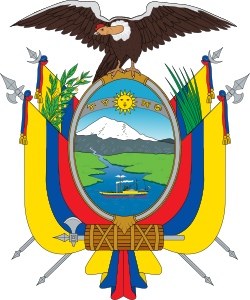 |
|---|
This article contains a list of presidents of Ecuador, since the independence from Gran Colombia (1830) to the present day.

 |
|---|
This article contains a list of presidents of Ecuador, since the independence from Gran Colombia (1830) to the present day.
Juan José Flores was the first constitutional president of Ecuador, declaring the separation of the State of Ecuador from Gran Colombia, maintaining its presidential government structure, which has remained until the present day. Between 1830 and 1845, the office of President of the Republic was elected indirectly, that is, through the legislature. The first presidents were mostly elected through Constituent Assemblies, a tradition in the politics of Ecuador which remained until 1967, with Otto Arosemena being the last constitutional president elected through the Constituent Assembly. This is one of the reasons why Ecuador has had 20 Constitutions since its foundation, many of them created with the intention of legitimizing the government of a president. Since 1869, the president is elected by popular vote; however, it should be borne in mind that during the 19th century, Ecuador lived a census democracy: only men with sufficient income and decent office voted, being Francisco Robles the first president elected by direct vote. [1]

Between 1906 and 1944, during the Liberal Revolution, the elections were held in a generally fraudulent or corrupt manner, so the year 1944 is estimated as the beginning of democracy in Ecuador. Between 1906 and 1947, there was no office of Vice President. Between 1947 and 1970, the president and vice president were elected separately. Since 1979, the president and vice president are elected by direct suffrage on the same ballot. Since 1998, a candidate who obtains more than 40% of votes can also win, provided he has a difference of at least 10% over the second candidate. All these percentages are calculated on the total valid votes (that is, without counting null and blank votes). [2]
The history of Ecuador has been full of instability, usually centered on the figure of the President of the Republic, which is why Ecuador's political culture has been traditionally called caudillista . During the 19th century, the country was torn apart twice after the overthrow of the presidents Francisco Robles and Ignacio de Veintemilla, with regional governments seeking access to national power. Until 1947, the majority of the constitutional presidents of the Republic came to power through coups d'état, exercising dictatorial power which would be legitimized through the implementation of new constitutions, so that the governance and stability of the presidents has been usually weak, which is why there has been many presiding and interim presidents. There were two military dictatorships in the country (1963–1966 and 1972–1979) before democracy returned with the election of Jaime Roldós Aguilera. From 1996 to 2005, 3 constitutional presidents were overthrown (Abdalá Bucaram, Jamil Mahuad and Lucio Gutiérrez). The left-wing populist government of Rafael Correa (2007–2017) has been the most stable in national history, being able to remain in power constitutionally without interruptions for 10 years and 4 months. [1] José María Velasco Ibarra is the longest-serving president since he held office for a total of 12 years, 10 months and 6 days and was elected President 5 times (1934–35, 1944–47, 1952–56, 1960–61 and 1968–1972).
Legend:
| No. | Portrait | Name (Birth–Death) | Term of office | Political party | Elected | Cabinet | Ref. | |||
|---|---|---|---|---|---|---|---|---|---|---|
| Took office | Left office | Time in office | ||||||||
| | ||||||||||
| — |  | Juan José Flores (1800–1864) | 3 May 1830 | 14 August 1830 | 103 days | Independent | — | Flores I | ||
| 1 | 14 August 1830 | 10 September 1834 | 4 years, 27 days | 1830 | ||||||
| 2 |  | Vicente Rocafuerte (1783–1847) | 10 September 1834 | 8 August 1835 | 332 days | Independent | — | Rocafuerte | ||
| | ||||||||||
| (2) |  | Vicente Rocafuerte (1783–1847) | 8 August 1835 | 31 January 1839 | 3 years, 176 days | Independent | 1835 | Rocafuerte | ||
| (1) |  | Juan José Flores (1800–1864) | 1 February 1839 | 6 March 1845 (deposed) | 6 years, 136 days | Independent | 1839 | Flores II | ||
| 1843 | Flores III | |||||||||
| — |  | José Joaquín de Olmedo (1780–1847) President of the triumvirate | 6 March 1845 | 8 December 1845 | 174 days | Independent | — | Provisional | ||
| 3 |  | Vicente Ramón Roca (1792–1858) | 8 December 1845 | 15 October 1849 | 3 years, 311 days | Independent | 1843 | Roca | ||
| — |  | Manuel de Ascásubi (1804–1876) acting | 15 October 1849 | 7 December 1850 | 1 year, 53 days | Independent | — | Ascásubi I | ||
| — |  | Diego Noboa (1789–1870) | 8 December 1850 | 25 February 1851 | 79 days | Independent | — | D. Noboa | ||
| 4 | 25 February 1851 | 12 September 1851 | 199 days | 1851 | ||||||
| 5 |  | José María Urvina (1808–1891) | 24 July 1851 | 17 July 1852 | 359 days | Independent | — | Urvina | ||
| 17 July 1852 | 15 October 1856 | 4 years, 90 days | 1852 | |||||||
| 6 |  | Francisco Robles (1811–1893) | 16 October 1856 | 31 August 1859 | 2 years, 319 days | Independent | 1856 | Robles | ||
| — |  | Gabriel García Moreno (1821–1875) | 17 January 1861 | 2 April 1861 | 75 days | Conservative Party | — | Moreno I | ||
| 7 | 2 April 1861 | 30 August 1865 | 4 years, 150 days | 1861 | ||||||
| — |  | Rafael Carvajal (1818–1881) acting | 31 August 1865 | 7 September 1865 | 7 days | Conservative Party | — | Moreno I | ||
| 8 |  | Jerónimo Carrión (1804–1873) | 7 September 1865 | 6 November 1867 | 2 years, 60 days | Conservative Party | 1865 | Carrión | ||
| — |  | Pedro José de Arteta (1797–1873) acting | 7 November 1867 | 20 January 1868 | 74 days | Conservative Party | — | Arteta | ||
| 9 |  | Javier Espinosa (1815–1870) | 20 January 1868 | 19 January 1869 | 365 days | Conservative Party | 1868 | Espinosa | ||
| — |  | Gabriel García Moreno (1821–1875) acting | 19 January 1869 | 19 May 1869 | 120 days | Conservative Party | — | Moreno II | ||
| — |  | Manuel de Ascásubi (1804–1876) acting | 19 May 1869 | 10 August 1869 | 83 days | Conservative Party | — | Ascásubi II | ||
| (7) |  | Gabriel García Moreno (1821–1875) | 10 August 1869 | 6 August 1875 † | 5 years, 361 days | Conservative Party | 1869 | Moreno III | ||
| 1875 (May) | ||||||||||
| — |  | Francisco Xavier León (1832–1880) acting | 6 August 1875 | 15 September 1875 | 40 days | Conservative Party | — | León | ||
| — |  | José Javier Eguiguren (1816–1884) acting | 15 September 1875 | 9 December 1875 | 85 days | Conservative Party | — | Eguiguren | ||
| 10 |  | Antonio Borrero (1827–1911) | 9 December 1875 | 18 December 1876 | 1 year, 9 days | Conservative Party | 1875 (Oct.) | A. Borrero | ||
| 11 |  | Ignacio de Veintemilla (1828–1908) | 18 December 1876 | 26 January 1878 | 1 year, 39 days | Military | — | Veintemilla | ||
| 21 April 1878 | 26 March 1882 | 3 years, 339 days | 1878 | |||||||
| 26 March 1882 | 9 July 1883 | 1 year, 105 days | — | |||||||
| — |  | Luis Cordero Crespo (1833–1912) Government of the Restoration | 1 July 1892 | 16 April 1895 | 2 years, 289 days | Republican Union Party | — | Restoration | ||
| — | 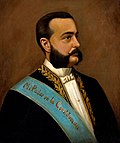 | José Plácido Caamaño (1837–1900) | 15 October 1883 | 10 February 1884 | 118 days | Conservative Party | — | Caamaño | ||
| 12 | 10 February 1884 | 30 June 1888 | 4 years, 141 days | 1884 | ||||||
| — |  | Pedro José Cevallos (1830–1892) acting | 1 July 1888 | 17 August 1888 | 47 days | Conservative Party | — | Caamaño | ||
| 13 |  | Antonio Flores Jijón (1833–1915) | 17 August 1888 | 10 June 1892 | 3 years, 298 days | Republican Union Party | 1888 | Jijón | ||
| 14 |  | Luis Cordero Crespo (1833–1912) | 1 July 1892 | 16 April 1895 | 2 years, 289 days | Republican Union Party | 1892 | Crespo | ||
| — |  | Vicente Lucio Salazar (1832–1896) acting | 16 April 1895 | 5 June 1895 | 50 days | Conservative Party | — | Salazar | ||
| 15 |  | Eloy Alfaro (1842–1912) | 5 June 1895 | 9 October 1896 | 1 year, 126 days | Ecuadorian Radical Liberal Party | — | Alfaro I | ||
| 9 October 1896 | 31 August 1901 | 4 years, 326 days | 1897 | |||||||
| 16 |  | Leónidas Plaza (1865–1932) | 1 September 1901 | 31 August 1905 | 4 years | Ecuadorian Radical Liberal Party | 1901 | Plaza I | ||
| 17 |  | Lizardo García (1844–1937) | 1 September 1905 | 15 January 1906 | 136 days | Ecuadorian Radical Liberal Party | 1905 | García | ||
| (15) |  | Eloy Alfaro (1842–1912) | 16 January 1906 | 9 October 1906 | 266 days | Ecuadorian Radical Liberal Party | — | Alfaro II | ||
| 9 October 1906 | 11 August 1911 | 4 years, 306 days | 1906 | |||||||
| — |  | Carlos Freile Zaldumbide (1851–1928) acting | 11 August 1911 | 31 August 1911 | 20 days | Ecuadorian Radical Liberal Party | — | Zaldumbide I | ||
| 18 |  | Emilio Estrada (1855–1911) | 1 September 1911 | 21 December 1911 | 111 days | Ecuadorian Radical Liberal Party | 1911 | Estrada | ||
| — |  | Carlos Freile Zaldumbide (1851–1928) acting | 22 December 1911 | 5 March 1912 | 74 days | Ecuadorian Radical Liberal Party | — | Zaldumbide II | ||
| — |  | Francisco Andrade Marín (1841–1935) acting | 6 March 1912 | 1 August 1912 | 148 days | Ecuadorian Radical Liberal Party | — | Marín | ||
| — |  | Alfredo Baquerizo (1859–1951) acting | 1 August 1912 | 1 September 1912 | 31 days | Ecuadorian Radical Liberal Party | — | Baquerizo I | ||
| (16) |  | Leónidas Plaza (1865–1932) | 1 September 1912 | 31 August 1916 | 4 years | Ecuadorian Radical Liberal Party | 1912 | Plaza II | ||
| 19 |  | Alfredo Baquerizo (1859–1951) | 1 September 1916 | 31 August 1920 | 4 years | Ecuadorian Radical Liberal Party | 1916 | Baquerizo II | ||
| 20 |  | José Luis Tamayo (1858–1947) | 1 September 1920 | 31 August 1924 | 4 years | Ecuadorian Radical Liberal Party | 1920 | Tamayo | ||
| 21 |  | Gonzalo Córdova (1863–1928) | 1 September 1924 | 9 July 1925 | 311 days | Ecuadorian Radical Liberal Party | 1924 | Córdova | ||
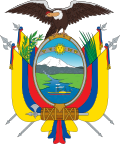 | First Provisional Government collective leadership | 10 July 1925 | 6 January 1926 | 180 days | — | Provisional I | ||||
 | Second Provisional Government collective leadership | 10 January 1926 | 31 March 1926 | 80 days | — | Provisional II | ||||
| — |  | Isidro Ayora (1879–1978) | 3 April 1926 | 17 April 1929 | 3 years, 14 days | Ecuadorian Radical Liberal Party | — | Ayora | ||
| 22 | 17 April 1929 | 24 August 1931 | 2 years, 129 days | 1929 | ||||||
| — |  | Luis Larrea Alba (1894–1979) acting | 24 August 1931 | 15 October 1931 | 52 days | Ecuadorian Radical Liberal Party | — | Alba | ||
| — |  | Alfredo Baquerizo (1859–1951) acting | 15 October 1931 | 28 August 1932 | 318 days | Ecuadorian Radical Liberal Party | — | Baquerizo III | ||
| — |  | Carlos Freile Larrea (1876–1942) acting | 28 August 1932 | 1 September 1932 | 4 days | Ecuadorian Radical Liberal Party | — | Larrea | ||
| — |  | Alberto Guerrero Martínez (1878–1941) acting | 2 September 1932 | 4 December 1932 | 93 days | Ecuadorian Radical Liberal Party | — | Martínez | ||
| 23 |  | Juan de Dios Martínez (1875–1955) | 5 December 1932 | 19 October 1933 | 318 days | Ecuadorian Radical Liberal Party | 1932 | J. Martínez | ||
| — |  | Abelardo Montalvo (1876–1950) acting | 20 October 1933 | 31 August 1934 | 315 days | Ecuadorian Radical Liberal Party | — | Montalvo | ||
| 24 |  | José María Velasco Ibarra (1893–1979) | 1 September 1934 | 21 August 1935 | 354 days | Independent | 1934 | Ibarra I | ||
| — |  | Antonio Pons (1897–1980) acting | 21 August 1935 | 25 September 1935 | 35 days | Conservative Party | — | Pons | ||
| — |  | Federico Páez (1877–1974) Jefe Supremo | 26 September 1935 | 23 October 1937 | 2 years, 27 days | Independent | — | Páez | ||
| — |  | Alberto Enríquez Gallo (1894–1962) Jefe Supremo | 23 October 1937 | 10 August 1938 | 291 days | Military | — | Gallo | ||
| — |  | Manuel María Borrero (1883–1975) acting | 10 August 1938 | 1 December 1938 | 113 days | Ecuadorian Radical Liberal Party | — | M. Borrero | ||
| 25 |  | Aurelio Mosquera (1883–1939) | 2 December 1938 | 17 November 1939 | 350 days | Ecuadorian Radical Liberal Party | 1938 | Mosquera | ||
| — |  | Carlos Alberto Arroyo del Río (1893–1969) acting | 18 November 1939 | 10 December 1939 | 22 days | Ecuadorian Radical Liberal Party | — | Río I | ||
| — |  | Andrés Córdova (1892–1983) acting | 11 December 1939 | 10 August 1940 | 243 days | Ecuadorian Radical Liberal Party | — | Córdova | ||
| — |  | Julio Enrique Moreno (1879–1952) acting | 10 August 1940 | 31 August 1940 | 21 days | Ecuadorian Radical Liberal Party | — | J. Moreno | ||
| 26 |  | Carlos Alberto Arroyo del Río (1893–1969) | 1 September 1940 | 28 May 1944 | 3 years, 270 days | Ecuadorian Radical Liberal Party | 1940 | Río II | ||
| — |  | Julio Teodoro Salem (1900–1968) acting | 29 May 1944 | 31 May 1944 | 2 days | Ecuadorian Radical Liberal Party | — | Democratic Alliance | ||
| (24) |  | José María Velasco Ibarra (1893–1979) | 1 June 1944 | 23 August 1947 | 3 years, 83 days | Independent | 1944 | Ibarra II | ||
| 1946 | Ibarra III | |||||||||
| — |  | Carlos Mancheno Cajas (1902–1996) Jefe Supremo | 23 August 1947 | 2 September 1947 | 10 days | Military | — | Cajas | ||
| 27 | 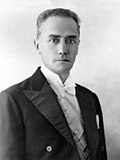 | Mariano Suárez Veintimilla (1897–1980) | 2 September 1947 | 17 September 1947 | 15 days | Conservative Party | 1946 | Veintimilla | ||
| 28 |  | C. J. Arosemena Tola (1888–1952) | 17 September 1947 | 31 August 1948 | 349 days | Independent | 1947 | Tola | ||
| 29 |  | Galo Plaza (1906–1987) | 1 September 1948 | 31 August 1952 | 4 years | National Democratic Civic Movement | 1948 | G. Plaza | ||
| (24) |  | José María Velasco Ibarra (1893–1979) | 1 September 1952 | 31 August 1956 | 4 years | Velaquista National Federation | 1952 | Ibarra IV | ||
| 30 |  | Camilo Ponce Enríquez (1912–1976) | 1 September 1956 | 31 August 1960 | 4 years | Social Christian Party | 1956 | Enríquez | ||
| (24) |  | José María Velasco Ibarra (1893–1979) | 1 September 1960 | 7 November 1961 | 1 year, 67 days | Velaquista National Federation | 1960 | Ibarra V | ||
| 31 |  | C. J. Arosemena Monroy (1919–2004) | 7 November 1961 | 11 July 1963 | 1 year, 246 days | Independent | — | Monroy | ||
| — |  | Admiral Ramón Castro Jijón (1915–1984) Chairman of the Military Junta of 1963 | 11 July 1963 | 29 March 1966 | 2 years, 261 days | Military | — | Military Junta | ||
| — |  | General Telmo Vargas (1912–2013) Acting Chairman of the Military Junta of 1963 | 29 March 1966 | 29 March 1966 | 0 days | Military | — | Military Junta | ||
| – |  | Clemente Yerovi (1904–1981) acting | 30 March 1966 | 16 November 1966 | 231 days | Institutionalist Democratic Coalition | — | Yerovi | ||
| — |  | Otto Arosemena (1925–1984) | 16 November 1966 | 25 May 1967 | 190 days | Institutionalist Democratic Coalition | — | Arosemena | ||
| 32 | 25 May 1967 | 31 August 1968 | 1 year, 98 days | — | ||||||
| (24) |  | José María Velasco Ibarra (1893–1979) | 1 September 1968 | 15 February 1972 | 3 years, 167 days | Velaquista National Federation | 1968 | Ibarra VI | ||
| — | 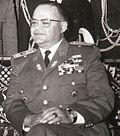 | General Guillermo Rodríguez Lara (born 1923) Chairman of the Council of Government | 15 February 1972 | 11 January 1976 | 3 years, 330 days | Military | — | Council of Government | [3] | |
| — |  | Vice Admiral Alfredo Poveda (1926–1990) President of the Supreme Council of Government | 11 January 1976 | 10 August 1979 | 3 years, 211 days | Military | — | Supreme Council | ||
| 33 |  | Jaime Roldós Aguilera (1940–1981) | 10 August 1979 | 24 May 1981 | 1 year, 287 days | Concentration of People's Forces | 1979 | Roldós | ||
| 34 |  | Osvaldo Hurtado (born 1939) | 24 May 1981 | 10 August 1984 | 3 years, 78 days | Popular Democracy | — | Hurtado | ||
| 35 |  | León Febres Cordero (1931–2008) | 10 August 1984 | 10 August 1988 | 4 years | Social Christian Party | 1984 | Febres Cordero | ||
| 36 |  | Rodrigo Borja Cevallos (1935–2025) | 10 August 1988 | 10 August 1992 | 4 years | Democratic Left | 1988 | Borja | ||
| 37 |  | Sixto Durán Ballén (1921–2016) | 10 August 1992 | 10 August 1996 | 4 years | Republican Unity Party | 1992 | Duran Ballén | ||
| 38 |  | Abdalá Bucaram (born 1952) | 10 August 1996 | 6 February 1997 | 180 days | Ecuadorian Roldosist Party | 1996 | Bucaram | ||
| — |  | Fabián Alarcón (born 1947) acting | 6 February 1997 | 9 February 1997 | 3 days | Alfarista Radical Front | — | [4] | ||
| 39 |  | Rosalía Arteaga (born 1956) | 9 February 1997 | 11 February 1997 | 2 days | MIRA Movement | — | R. Arteaga | [5] | |
| 40 |  | Fabián Alarcón (born 1947) | 11 February 1997 | 10 August 1998 | 1 year, 180 days | Alfarista Radical Front | — | Alarcón | ||
| 41 |  | Jamil Mahuad (born 1949) | 10 August 1998 | 21 January 2000 | 1 year, 164 days | Popular Democracy | 1998 | Mahuad | [6] | |
| 42 |  | Gustavo Noboa (1937–2021) | 22 January 2000 | 15 January 2003 | 2 years, 358 days | Independent | — | G. Noboa | ||
| 43 |  | Lucio Gutiérrez (born 1957) | 15 January 2003 | 20 April 2005 | 2 years, 95 days | Patriotic Society Party | 2002 | Gutiérrez | ||
| 44 |  | Alfredo Palacio (1939–2025) | 20 April 2005 | 15 January 2007 | 1 year, 270 days | Independent | — | Palacio | ||
| 45 |  | Rafael Correa (born 1963) | 15 January 2007 | 24 May 2017 | 10 years, 129 days | PAIS Alliance | 2006 | Correa I | ||
| 2009 | Correa II | |||||||||
| 2013 | Correa III | |||||||||
| 46 |  | Lenín Moreno (born 1953) | 24 May 2017 | 24 May 2021 | 4 years | PAIS Alliance | 2017 | L. Moreno | ||
| 47 |  | Guillermo Lasso (born 1955) | 24 May 2021 | 23 November 2023 | 2 years, 183 days | Creating Opportunities | 2021 | Lasso | ||
| 48 |  | Daniel Noboa (born 1987) | 23 November 2023 | Incumbent | 2 years, 56 days | National Democratic Action | 2023 | D. Noboa I | ||
| 2025 | D. Noboa II | |||||||||

| Picture | Name | Began | Ended | Title(s) |
|---|---|---|---|---|
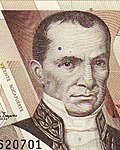 | Vicente Rocafuerte | 20 October 1833 | July 1834 | Jefe Supremo of the Department of the Guayas |
 | José Félix Valdivieso | 13 July 1834 | 18 January 1835 | Jefe Supremo |
 | José Joaquín de Olmedo | 6 March 1845 | 18 June 1845 | President of the Provisional Government |
 | Antonio de Elizalde | March 1850 | 1850 | Jefe Supremo |
 | Diego Noboa | 20 February 1850 | 10 June 1850 | Jefe Supremo |
 | José María Urvina | 13 July 1851 | 17 July 1851 | Jefe Supremo |
 | Provisional Government | 1 May 1859 | 4 June 1859 | Members: Gabriel García Moreno (from May 25) Manuel Gómez de la Torre (to May 25) José María Avilés Pacífico Chiriboga |
 | Jerónimo Carrión | 6 June 1859 | 1859 | |
 | Gabriel García Moreno | 4 June 1859 | 17 September 1861 | Jefe Supremo |
 | Guillermo Franco | 17 September 1859 | 24 September 1860 | Jefe Supremo of Guayas and Azuay |
 | Fernando Daquilema | 18 de diciembre de 1871 | 8 de abril de 1872 | King Shyri XVII |
 | Ignacio de Veintemilla | 8 September 1876 | 19 December 1876 | Jefe Supremo |
 | Eloy Alfaro | February 1883 | 11 October 1883 | Jefe Supremo of Manabí and Esmeraldas |
 | Provisional Government | 14 January 1883 | 9 July 1883 | Members: José María Sarasti Pedro Ignacio Lizarzaburu Agustín Guerrero Luis Cordero Crespo (from February 14) Pablo Herrera (to February 14) Rafael Pérez Pareja |
 | Pedro Carbo | 17 September 1883 | 11 October 1883 | Jefe Supremo of Guayas |
 | Eloy Alfaro | 19 June 1895 | 23 August 1895 | Jefe Supremo |
 | Flavio E. Alfaro Santana | 22 December 1911 | January 1912 | |
 | Pedro Jacinto Montero Maridueña | 28 December 1911 | 21 January 1912 |